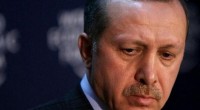Opinions

Gülen, Erdoğan’s new agenda item with the West
Yet, no matter how strong of views he might voice to his interlocutors about the Gülen movement (Cemaat) he can’t save himself from the problem of credibility. While he was giving assurance in Brussels that he is not interfering with the judiciary, the fact that the very same day the pressure exerted by the undersecretary of the Justice Ministry to the chief prosecutor in his investigation on a corruption case was revealed through documents will lead the EU to approach these assurances with suspicion.

An early prediction about the next elections
Turkey’s future will be determined in the next election. If the AKP government is not able to gain more than 38 percent of the total votes this time, it will directly affect the future of Turkish politics. Erdoğan cannot be the next president, for instance.

Islamist vs. Islamic
The followers of Gülen have opted to vote for and support various center parties freely. Moreover, their support has never amounted to partisanship. Rather, they have tended to back specific policies and the political parties that placed greater emphasis on democratization, demilitarization, transparency, accountability, fundamental rights and freedoms and economic stability.

Conceptual contradictions when it comes to rhetoric about ‘parallel state’
.In the wake of the Dec. 17 corruption operations that took place in Turkey, the government removed and changed such an extraordinarily high number of people from their positions in the police force, the justice system and the national education structure that these changes certainly would not have been possible in a state of law. An attempt was made to see these changes happen within the framework of heavy propaganda about the concept of the existence of a “parallel state.”

Shocking change and disappointed hearts…
Since Dec. 17, Erdoğan’s discourse has become more and more strict and a major smear campaign has been initiated by the pro-government media against the Hizmet movement, which has been active in education activities all around the world. The Hizmet movement and the followers of Hizmet have never been affiliated with violence or any other crime-related issues. This was proven as a result of a judicial process.

Are ambassadors propaganda officials for the ruling party?
Those who order ambassadors to put their citizens abroad in a difficult position in violation of human rights and national interests do not understand this: The international community is more concerned about whether the government sticks to democratic principles and the rule of law and less about who triggered the recent political crisis.

AK Party’s Islamism
Apparently, Erdoğan has sought not only to be unrivaled within Turkey, but also to create a totalitarian country according to his religious mentality using the resources available to him. The corruption investigations remove the veil over the details of this totalitarian project.

Neither Erdoğan nor EU the same after five years
Erdoğan is going to Brussels as the prime minister of Turkey who doesn’t even have ambassadors in three of its region’s important capital; Cairo, Tel Aviv and Damascus. A negotiation chapter was opened in November 2013 after a three-year freeze. Erdoğan had to sack the former EU minister from the cabinet because of the allegations in relation with a major graft probe in December 2013 and appointed Mevlüt Çavuşoğlu to that post.

This is too much! [About the Lies and Slanders directed to Gulen movement]
Prime minister said during the fourth ordinary general meeting of the Turkish Confederation of Businessmen and Industrialists (TUSKON) in March of 2012:
“You are not backed by dark forces. You are not backed by the mafia, gangs, junta regimes. You are not backed by the bankers in Galata. You did not take advantage of the sources of the Treasury or public banks. You did not act according to an ideology. You did not surrender to the pressures and roadblocks. You only trusted in the people. Because you only relied on people, you are great and make this country great.”

You cannot fool all the people all the time
In a panic to save its future, the Erdoğan government calling it a “parallel state,” an “illegal organization,” a “criminal gang,” a “web of treason” and “raving Hashashins” is attempting to collectively punish the Hizmet movement, whose establishments have significantly contributed to the betterment of the country in the fields of education, business, democratization, social solidarity and international relations.






















